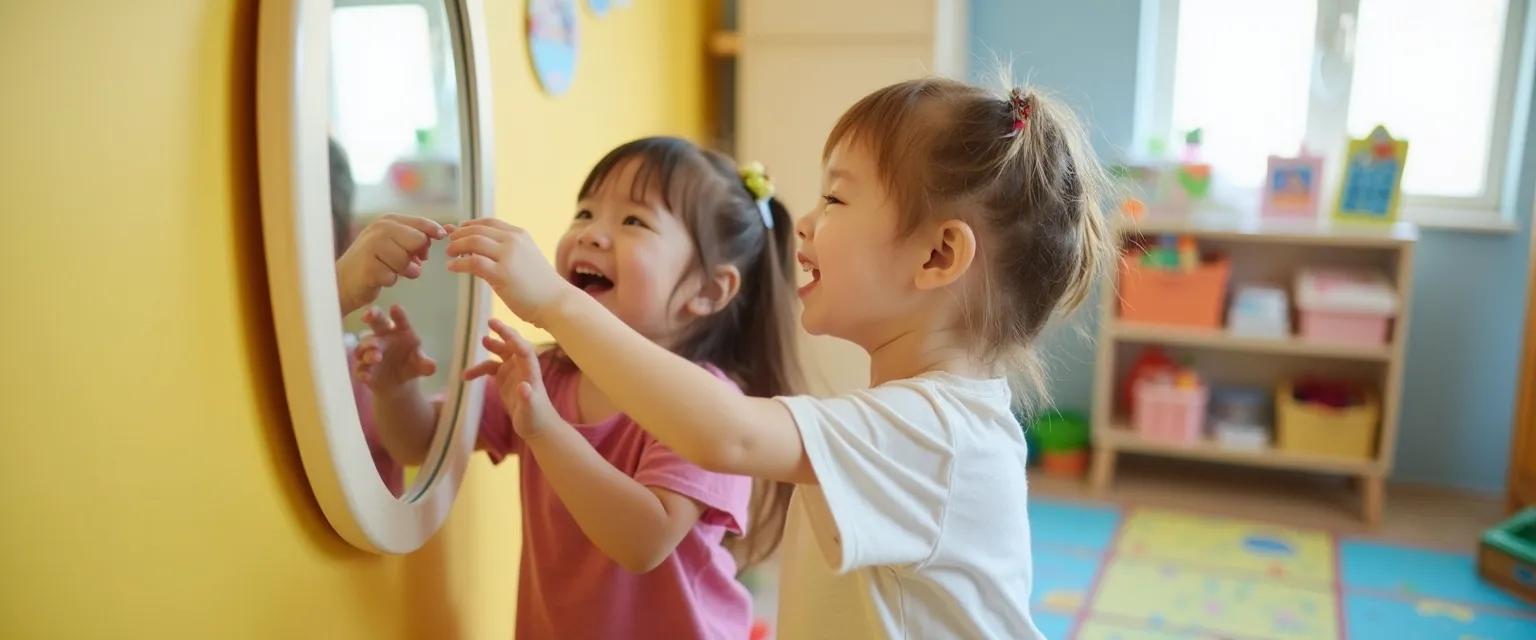5 Fun Mirror Games for Teaching Self-Awareness to Preschoolers Through Play
Playful moments in front of the mirror create natural opportunities for teaching self-awareness to preschoolers. These magical reflective experiences help young children discover who they are while having fun. Teaching self-awareness to preschoolers doesn't need to feel like a formal lesson—it can be woven into delightful games that capture their imagination while building crucial developmental skills. When children recognize themselves in mirrors, they're taking important steps toward understanding their identity and emotions.
Self-awareness forms the foundation for emotional intelligence, helping preschoolers recognize and name their feelings. Through mirror play, children naturally engage in self-discovery as they observe how their facial expressions change with different emotions. This emotional intelligence development serves them throughout life, making mirror games valuable tools for parents and educators alike.
Research shows that children typically begin recognizing themselves in mirrors between 18-24 months, marking a significant cognitive milestone. By preschool age, they're ready for more sophisticated mirror activities that strengthen this self-recognition and expand it into deeper self-awareness. These playful interactions create perfect bonding opportunities while teaching essential life skills.
Why Mirror Games Excel at Teaching Self-Awareness to Preschoolers
Mirror play offers unique advantages for teaching self-awareness to preschoolers that few other activities can match. When children see their reflections respond instantly to their movements, they make powerful connections between their internal experiences and external expressions. This immediate visual feedback helps them understand how their emotions appear to others.
Developmental psychologists have long recognized that mirror activities contribute significantly to cognitive and emotional growth. When engaged in mirror play, preschoolers develop an understanding of themselves as separate individuals with unique thoughts and feelings. This cognitive development process creates the foundation for empathy and social skills.
The playful nature of mirror games removes any pressure children might feel in more structured learning environments. Instead of formal teaching self-awareness to preschoolers approaches, these activities invite exploration through joy and curiosity. This positive emotional context enhances learning and helps children develop a healthy self-concept they'll carry forward throughout their lives.
5 Engaging Mirror Games for Teaching Self-Awareness to Preschoolers
Game 1: Emotion Mimics
Stand with your preschooler in front of a mirror and take turns making different facial expressions. Start with basic emotions like happy, sad, and surprised, then progress to more complex feelings like confused, excited, or frustrated. Ask your child to identify each emotion and describe how it feels in their body. This game directly connects teaching self-awareness to preschoolers with emotional literacy.
Game 2: Mirror, Mirror
In this follow-the-leader style game, one person performs movements while the other mimics them exactly like a reflection would. Switch roles frequently to give your preschooler practice both observing and performing. This activity enhances body awareness and coordination while teaching self-awareness to preschoolers in a dynamic way.
Game 3: Feature Detective
Challenge your child to identify and name different body parts in the mirror. Make it more engaging by asking questions like "Where are your eyebrows?" or "Can you show me your chin?" This self-recognition activity builds vocabulary while reinforcing body awareness.
Game 4: Silly Faces Challenge
Take turns creating the silliest faces possible in the mirror. After each face, have your child describe what they did with their features: "I puffed my cheeks and crossed my eyes!" This playful approach to teaching self-awareness to preschoolers encourages detailed observation and descriptive language.
Game 5: Mirror Dancing
Put on some music and dance together while watching yourselves in a full-length mirror. This joyful activity helps children connect their movements with what they see, enhancing coordination and spatial awareness while creating lasting bonding memories.
Integrating Self-Awareness Mirror Play into Your Preschooler's Routine
Consistency is key when teaching self-awareness to preschoolers through mirror play. Try incorporating these games into everyday routines—perhaps during morning tooth-brushing or before bedtime. Keep sessions brief (5-10 minutes) but regular to maintain engagement without overwhelming young attention spans.
Pay attention to your child's responses during mirror activities. When they begin accurately identifying emotions, describing facial features in detail, or showing increased interest in their reflection, you're seeing signs of developing self-awareness. Celebrate these moments with positive reinforcement.
Remember that teaching self-awareness to preschoolers through mirror play isn't just educational—it's also about creating joyful connections. These shared experiences build trust and communication while laying important foundations for emotional intelligence that will benefit your child throughout life.




